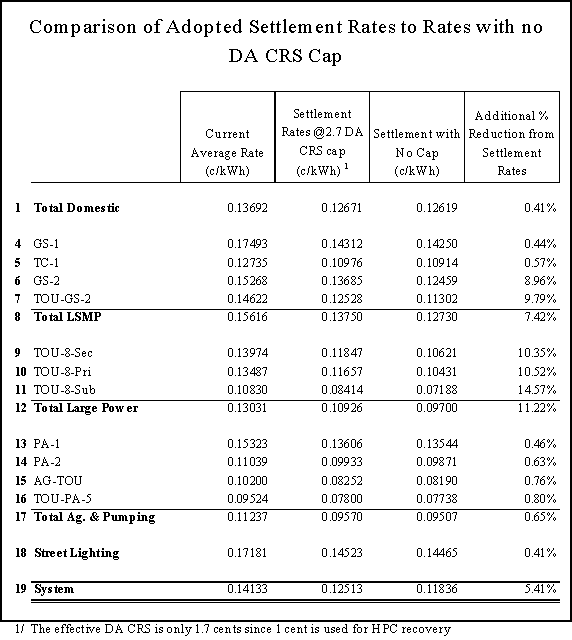Dissenting Opinion of Carl Wood to D.03-07-030
I dissent from the adopted decision because it fails to adhere to our Legislative mandate of ensuring that costs are not shifted to bundled customers. I remain concerned that D.03-07-030 moves us yet further away from that mandate. I believe that with each decision in this proceeding, we have continued to subvert the intent of the Legislation to suspend direct access. First, we declined to adopt a suspension date of July 1, 2001, with the promise that we would develop a Direct Access Customer Responsibility Surcharge that would protect the interests of bundled customers. In fact, at times we expressed the same concern as the Legislation and vowed to develop a CRS that would recover the costs associated with the DWR Long Term Contracts regardless of its impact on the viability of Direct Access. However, we soon deviated from the Legislative mandate and developed a policy position that would ensure that Direct Access remained economic - we put the interests of Direct Access customers above those of bundled customers by forcing a low-interest loan from bundled customers to Direct Access customers simply to forgive them from paying their fair share of costs they had been avoiding while this Commission implemented AB1x. The adopted decision now includes language expanding our policy (which I again emphasize is contrary to the unequivocal Legislative mandate to suspend direct access) by emphasizing the alleged public benefits of maintaining Direct Access. Those purported benefits include job creation, tax support for the State economy and diversification of energy resources.
There is simply nothing in the record to support the assertions now being made that any of these benefits even exist, to say nothing of whether they might be any more than or less with any cap level - or indeed, without a cap at all. While we initiated this phase of the proceeding to assess the level of the cap we adopted in November of last year, we have so far developed little more than anecdotal evidence that DA will become uneconomic at 2.7 or 4.0 cents. It is not clear which of those parties that testified to the economic impact a higher cap would have on their operations may already be exempt from the cap because they've been continuous direct access customers. However, without minimizing the economic impact of any cap on direct access, I am concerned that the discussion has completely failed to acknowledge the impact of the accrued undercollection on business and small commercial customers.
Some continue to believe that 2.7 cents cap achieves the goal of maintaining bundled customer indifferent while causing least harm to the economy. Interestingly, some continue to profess that so long as we maintain bundled customer indifference over any time period is good for the economy. This suggests that while we attempt to ensure that direct access remains economical we do so while only ensuring that bundled customers remain indifferent. We are protecting the interests of a few customers at the expense of many. What is forgotten is that the majority of California electric consumers are bundled utility customers, which includes business, commercial and industrial customers. It is indeed a sweet deal for any customer to be able to avoid paying lump sums for costs incurred on their behalf. It's a shame that the interests of bundled business and small commercial customers - who stand to lose the most - have not been represented at all. Statewide, as of May 2003 there were approximately:
· Over 1 million bundled business accounts and
10,000 direct access business accounts
· 206,000 bundled commercial accounts and
11,000 direct access commercial accounts
· 5,500 bundled industrial accounts and
1,000 direct access industrial accounts.
Preliminary analysis done by Energy Division suggests that in Edison's territory, bundled business and small commercial customers would face an additional rate reduction of at least 10% over the rate reductions we recently approved in the PROACT settlement decision if no direct access cap existed. This analysis is based on comparing the current cap at 2.7 cents versus lifting the cap altogether and obligating Direct Access customers to immediately pay back any DWR contract undercollections that have been accrued on their behalf. Clearly, by increasing the cap on direct access to 4.0 cents, bundled business, commercial, and industrial customers stand to benefit by more quickly offsetting the accrued undercollections of Direct Access customers.
In short, I firmly believe that our mandate is unequivocal. We are to protect the interests of bundled customers. And since bundled business, commercial and industrial customers make up more than 90% of the states economy, our focus really needs to be on the impact that a large undercollection would have on their rates. It is those customers, the majority that do business in California, who will provide greater benefits. Finally, as I have noted, the parties have failed to provide the necessary data to assess the impact of any cap level on direct access customers.
/s/ CARL WOOD
Carl Wood
Commissioner
San Francisco, California
July 10, 2003



